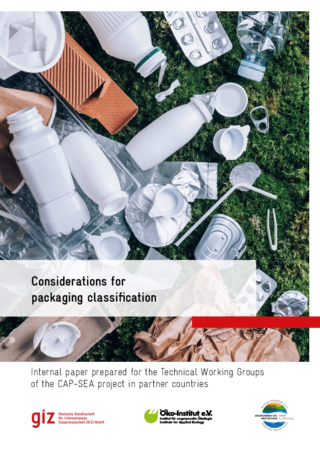Considerations for packaging classification

The GIZ is implementing a global project “Support of the Export Initiative for Green Technologies” as a contribution to solving key environmental problems on behalf of the German Federal Ministry for the Environment (BMU). The BMU Export Initiative aims to export know-how available in Germany and support sustainable development worldwide. It includes topics such as poor waste management, air and water pollution or supporting infrastructures for sustainable urban development. Partner countries are Egypt, Jordan, India,
Thailand, Malaysia, Indonesia and Ukraine. Project measures focus on building up technical and institutional know-how as well as laying the groundwork for the introduction and use of environmental and climate protection technologies “Made in Germany”.
The project component CAP SEA, which stands for Collaborative Action for Single-Use Plastic Prevention in Southeast Asia, focusses on the prevention of single-use plastic (SUP) and reusable packaging systems in Thailand, Malaysia, and Indonesia. Based on its wide experience and knowledge in the field of plastics and packaging in Europe, Oeko-Institut is advising partner institutions in Thailand, Malaysia, and Indonesia in developing context-specific policies, legislation and standards to promote Circular Economy and curb plastic waste in Southeast Asia. The following paper represents one of many short papers prepared by the Oeko-Institut in this context to initiate discourse and guide policy development on single-use plastic prevention in partner countries.


